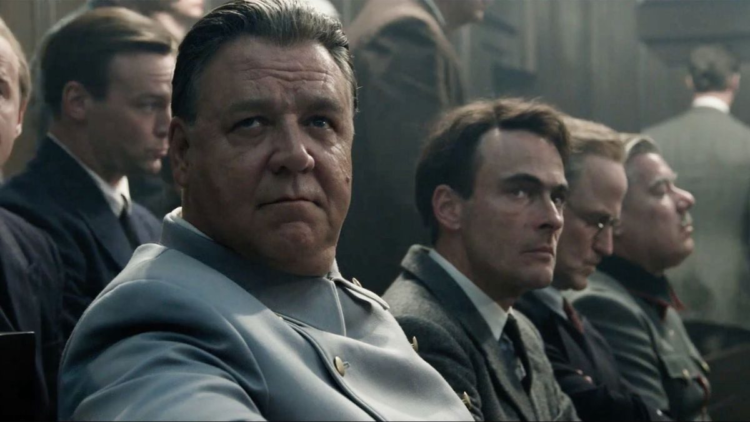
Note: This review was originally published as part of our 2025 TIFF coverage. Nuremberg opens in theaters on November 7.
Stanley Kubrick, in one of the most famous director disses ever, remarked that the failing of his friend Steven Spielberg’s Schindler’s List was that the Holocaust was six million people being killed, while the film decided to make it about the 600 who didn’t. Though placing moral rules on film, to this writer, doesn’t always make for either an interesting conversation or cinema, one can’t help thinking of Kubrick’s line a little when looking at Nuremberg, the new film about the post-WWII tribunals that held accountable the highest-ranking, still-living Nazi commanders. Judging by the conflict between crowd-pleasing instincts and a wannabe-chilling finale, one feels the filmmakers aren’t even sure what they think the atrocity was about in general.
Nuremberg begins on the last day of WWII in Germany, replete with American soldiers pissing on a swastika (a sign of the film’s surprisingly heavy reliance on humor), only to then encounter Hitler’s second-in-command, Hermann Goring (Russell Crowe), who is quickly arrested. The first process on a granddaddy of all trials begins, orchestrated by US Supreme Court Justice Robert H. Jackson (Michael Shannon), who needs to get all of Europe’s superpowers on board––among them Britain, the Soviets, even the Catholic Church. The trial is a complicated one, though, and American military psychiatrist Douglas Kelley (Rami Malek) is called aboard to help begin the process of analyzing the cunning Goring so as to best get his ass in court.
Despite the very solemn subject matter at hand, Nuremberg better resembles the films of Joseph H. Mankiewicz or Billy Wilder than, say, the Stanley Kramer picture on this same subject. Every character is a quip machine, and writer-director James Vanderbilt seems to consciously not want to have the film bogged down in heaviness. You also get a slight sense of post-Oppenheimer cinema in the pretty rapid pacing, and it’s to its credit that it doesn’t feel like too much of a heaving object despite a two-and-a-half-hour runtime.
Nuremberg begins seriously faltering once it actually gets to the courtroom and reveals that not much complexity is at hand. The film wants to posit a Clarice Starling / Hannibal Lecter battle of wills between Kelley and Goring, with the former maybe seeing a more complex figure than the villain painted by the rest of the world, but––big surprise––he’s just as evil as everyone else says. What’s the dramatic point of a film where the lead is just catching up to the righteous bureaucrats who play supporting roles?
Nuremberg goes down easily enough for the first two acts, but you begin to question the purpose of the whole enterprise by the end, where it tries making a grander point about the pathology of evil that nothing in the rest of the film supported. It seems to want you leaving the theater on an unsettled note, but you’re probably just going to be regaling your friends with Michael Shannon telling off the Pope about antisemitism with an Aaron Sorkin-esque zinger.
Nuremberg premiered at the 2025 Toronto International Film Festival and opens on November 7.
The post Nuremberg Review: A Historical Drama Lacking Complexity first appeared on The Film Stage.
from The Film Stage https://ift.tt/jJhyKmS


0 Comments